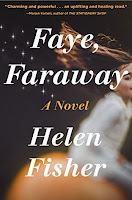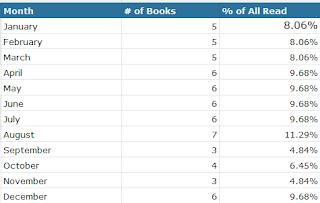Happy New Year!
As I sit down to write this recap and reflect upon what
type of year this has been, I can’t help but agree with everyone who has used
words such as “challenging” or “unprecedented” or “difficult” to describe 2020. While everyone
copes with difficult situations in a myriad of different ways, my “go-to” method
in times of stress has always been to escape my worries by seeking solace in
books and reading. So as I look back at
my reading life in 2020, it is definitely not a surprise to me that I have read
more books this past year than I have any other year to date. Though technically speaking, my total number
of books read this past year, on average, is not too huge of a difference from
past years (that number usually hovers between 55 to 60 books), I feel like I’ve
gotten more out of my reading in 2020 than I have compared to other years. While there were definitely months where it
was difficult to focus given everything else that was going on in the world, one
thing I noticed about my reading life this past year is that it was a lot more “reflective”
than years past -- meaning that I seemed to gravitate more toward books that were
either “comfort reads” for me in genres that I love, or that added to my
understanding and helped me make (some) sense of the complicated world I’m currently
living in.
For 2021, one of the things I would like to do is go back
to trying out genres that I don’t normally read (i.e. sci-fi and fantasy) –
which I’ve done the past couple years but didn’t in 2020 because of the reasons
mentioned above. As I’ve mentioned
before, I’ve always been a huge advocate of reading widely and diversely -- while
I still found ways to diversify my reading last year, genre-wise I pretty much
stuck to the “tried and true” ones where I knew it would be more likely for me
to have a positive reading experience.
In addition to the above, another big goal for 2021 in
terms of my reading life is to read more of the books I own or that are on
either my physical or electronic bookshelves.
I bought a lot of books last year (in both e-book and print format),
many of which I have not had the chance to read. Of course, I will still be requesting and
reading ARCs of new releases like I usually do (I don’t see myself ever being
able to get away from that), but I hope to manage it better this year in terms of
balancing ARCs of new releases with backlist books that I already own.
So without further ado, here’s my recap, starting with
stats from my 2020 reading log:
Favorite Reads of 2020
Below is my list of favorite reads this year (in no particular
order) – all of these books I rated 5 stars:
I’d Give Anything by Marisa de los Santo
The Color of Air by Gail Tsukiyama
Musical Chairs by Amy Poeppel
The Exiles by Christina Baker Kline
Anxious People by Fredrik Backman
Before the Ever After by Jacqueline Woodson
Stories from Suffragette City (short story collection
edited by M.J. Rose and Fiona Davis)
The Vanishing Half by Brit Bennett
The Poet X by Elizabeth Acevedo
The following books I rated 4.5 stars, which for me means that they were all
excellent books in their own right, it’s just that they didn’t give me the 5
star “vibe” due to a minor flaw or two:
Long Bright River by Liz Moore
These Women by Ivy Pochoda
The Last Train to Key West by Chanel Cleeton
Eat a Peach by David Chang
Silver Sparrow by Tayari Jones
Fifty Words for Rain by Asha Lemmie
The following books I rated 4 stars but they were particularly enjoyable reads for me
so I figured I would mention them as well (again, in no particular order):
Big Lies in a Small Town by Diane Chamberlain
Interior Chinatown by Charles Yu
All the Ways We Said Goodbye by Beatriz Williams, Lauren Willig,
and Karen White
Hollywood Park: A Memoir by Mikel Jollett
Resistance Women by Jennifer Chiaverini
You Are Not Alone by Greer Hendricks and Sarah Pekkanen
Deceit and Other Possibilities by Vanessa Hua
Days of Distraction by Alexandra Chang
Daughter of the Reich by Louise Fein
Redhead by the Side of the Road by Anne Tyler
Lovely War by Julie Berry
28 Summers by Elin Hilderbrand
The Second Home by Christina Clancy
His & Hers by Alice Feeney
Tell Me Three Things by Julie Buxbaum
The Jane Austen Society by Natalie Jenner
The Night Swim by Megan Goldin
Dear Emmie Blue by Lia Louis
Don’t Look For Me by Wendy Walker
A Single Swallow by Zhang Ling
White Ivy by Susie Yang
Relish: My Life in the
Kitchen by Lucy Knisley
You Have a Match by Emma Lord


















































